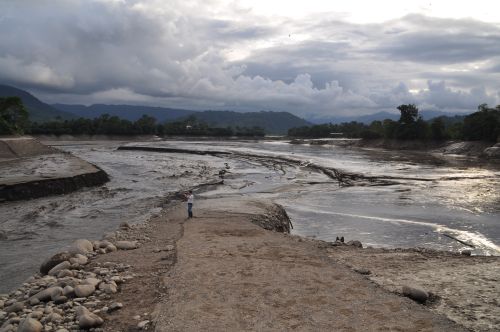Prospects for water reservoirs

Sediment deposits block the inflows and outflows of reservoirs, reduce the storage capacity and release dangerous gases when they are dissolved. University of Stuttgart
Water, the basis of life, is becoming increasingly scarce; many ecological, economic and socio-political challenges and conflicts are increasingly linked to water. With a sum of around six million Euros in the next five years, the Research Ministry is strengthening the scientific cooperation between various specialist disciplines in the field of water research in Baden-Württemberg.
One of the three projects selected by an international advisory committee is the network CHARM (Challenges of Reservoir Management) at the University of Stuttgart that dedicates itself to the management of water reservoirs taking into account ecological and social aspects and receives around two million Euros. The universities of Freiburg and Constance are also involved along with the University of Stuttgart.
CHARM explores five large challenges that result from operating and managing water reservoirs: the deposit of sediments, the formation of microbial films, the growth and spread of blue-green algae, methane gas emissions as well as social conflicts. In so doing socio-economic and ecological problem fields are treated in order to guarantee a sustainable functionality of water reservoirs that make a very important contribution to water supply and energy generation.
“With the CHARM network we are beginning a cooperation, unknown in this constellation up to now, which ideally links the expertise of the three involved universities – sediment research in Stuttgart, algae and methane gas research in Constance and societal research in Freiburg“, emphasised the spokesperson of the new association, Prof. Silke Wieprecht from the Institute of Water and Environmental System Modelling at the University of Stuttgart.
The increasing occurrence of sediment deposits harbours the risk of organic (hazardous) substances also being able to accumulate, thus leading to blockages in the inflows and outflows in a reservoir. In addition the water capacity of the storage space on the whole is reduced through the deposits. In this way one percent of the worldwide storage capacity is currently lost each year – “that is more than will be added by new reservoirs that are currently under construction“, is how Prof. Wieprecht illustrated the problem. In CHARM algorithms for a dynamic modelling of erosion processes are developed that could serve as a basis for relevant management measures.
In addition microbial biofilms could promote the solidification of sediments and have a negative influence on the water quality. Therefore investigations are to be conducted in various experiments as to how abiotic factors, different temperature, light and flow ratios influence the composition and function of these microbial layers.
Risks through algal bloom and methane
Like many surface waters, reservoirs also suffer from the increased input of nutrients that can lead to a mass reproduction of blue-green algae (algal bloom) and with this to the quality of the water deteriorating. In order to develop relevant counter measures, the physical-chemical and biological processes that underlie such a mass development are investigated.
If accumulated sediments start moving again, blisters develop through which the climate poison methane is released. In order to evaluate the role of water reservoirs as a source of greenhouse gases (CO2, methane), spatial and temporal differentiated greenhouse gas measurements are carried out.
Last but not least reservoirs mean a great impact on the landscape that therefore occasionally brought about social resistance in the past. To avoid this in future, the public and pressure groups should be more involved. As a prerequisite for this the interests and the risk consciousness of these actors should be identified in CHARM.
Further information:
Prof. Silke Wieprecht., University of Stuttgart, Institute of Water and Environmental System Modelling, Chair for Hydraulic Engineering and Water Quantity Management Tel. +49 711 685-64461,
Email: wieprecht (at) iws.uni-stuttgart.de
Andrea Mayer-Grenu, University of Stuttgart, Department of University Communication, Tel. 0711/685-82176,
Email: andrea.mayer-grenu (at) hkom.uni-stuttgart.de
Media Contact
More Information:
http://www.uni-stuttgart.de/All latest news from the category: Ecology, The Environment and Conservation
This complex theme deals primarily with interactions between organisms and the environmental factors that impact them, but to a greater extent between individual inanimate environmental factors.
innovations-report offers informative reports and articles on topics such as climate protection, landscape conservation, ecological systems, wildlife and nature parks and ecosystem efficiency and balance.
Newest articles

NASA: Mystery of life’s handedness deepens
The mystery of why life uses molecules with specific orientations has deepened with a NASA-funded discovery that RNA — a key molecule thought to have potentially held the instructions for…

What are the effects of historic lithium mining on water quality?
Study reveals low levels of common contaminants but high levels of other elements in waters associated with an abandoned lithium mine. Lithium ore and mining waste from a historic lithium…

Quantum-inspired design boosts efficiency of heat-to-electricity conversion
Rice engineers take unconventional route to improving thermophotovoltaic systems. Researchers at Rice University have found a new way to improve a key element of thermophotovoltaic (TPV) systems, which convert heat…



